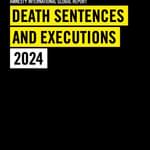
According to Amnesty International’s Annual Death Penalty Report, 15 countries carried out 1,518 known executions in 2024, constituting the lowest number of executing countries for the second consecutive year and the highest recorded execution figure since 2015, driven by increases in Iran, Saudi Arabia, and Iraq. 46 countries imposed 2,087 new death sentences in 2024, a 14% decrease from the prior year; however, changes in the accessibility of information across countries from make year-to-year comparisons difficult. The report notes “Africa remained the beacon of hope of abolition” with Zimbabwe abolishing the death penalty for ordinary crimes and Zambia, which fully repealed the death penalty in 2023, ratifying the Second Optional Protocol to the International Covenant on Civil and Political Rights.
When people prioritize campaigning for an end to the death penalty, it really does work. Despite the minority of leaders determined to weaponize the death penalty, the tide is turning. It’s only a matter of time until the world is free from the shadows of the gallows.
Global Report: Death Sentences and Executions 2024 explains that due to a lack of transparency in certain countries, recorded figures for executions and death sentences are a likely undercount, with actual figures likely higher. Regarded as the world’s leading executioner, China, which is estimated to execute thousands annually, restricts access to capital punishment figures, as do North Korea and Vietnam. The report notes additional difficulties in confirming execution and death sentence figures for 2024 for Palestine and Syria.
The 14% decrease in new death sentences brought the annual figure closer to figures seen in 2022. Eight countries which had imposed new death sentences in 2023 did not do so in 2024 (Cameroon, Gambia, Guyana, Maldives, Qatar, South Korea, Taiwan and Zimbabwe). South Sudan, Sudan, and Uganda imposed new death sentences after a hiatus in 2023. The Democratic Republic of the Congo, India, Iraq, Mauritania, Niger, Tunisia, and Yemen all had significant increases in new death sentences imposed in 2024. At the end of 2024, there were at least 28,085 people under sentence of death worldwide, including 11,667 (42%) in the Asia-Pacific region.
The 32% increase in recorded executions globally was primary due to regional increases in Iran, Saudi Arabia, and Iraq, which collectively accounted for 91% of worldwide executions. Iran, accounting for 64% of the total, executed at least 972 people, a 14% increase from the prior year. Saudi Arabia carried out at least 345 executions, double the total in 2023 (at least 172) and marking their highest recorded total ever. Iraq executed at least 63 people, constituting a four-fold increase from 2023 (at least 16). Egypt, Singapore, and Yemen also experienced notable increases in executions, while executions decreased slightly in Somalia (from 38 to 34 in 2024).
Those who dare challenge authorities have faced the most cruel of punishments, particularly in Iran and Saudi Arabia, with the death penalty used to silence those brave enough to speak out.
In its report, Amnesty explains that the use of the death penalty in several countries continues to violate international law when they involve public executions, executions of juveniles or those with mental or intellectual disabilities, executions for crimes other than intentional killing, unfair trial proceedings, and coerced confessions obtained under torture or ill-treatment. Although drug-related offenses do not meet the threshold of a “most serious” crime, 42% of global executions were for drug-related offenses, which were carried out in at least four countries (China, Iran, Singapore, and Saudi Arabia). 52% of executions (505) in Iran and 35% of executions (122) in Saudi Arabia were for drug-related offenses. In 2024, 13 countries imposed at least 337 new death sentences for drug-related offences. Executions for security-related charges were also common in the three nations (Iran, Iraq, and Saudi Arabia) driving the worldwide increase, with countries using the death penalty as a ” prominent tool…to exert control on the population and stifle dissent.” All known executions in Iraq were for terrorism-related charges. Those who challenged the government through protests were also among those sentenced to death and executed on security-related charges in both Saudi Arabia and Iran.
Commutations or pardons occurred in 18 countries, and nine exonerations occurred in Japan (1), Malaysia (5), and the U.S. (3). Following its abolition of the mandatory death penalty in 2023, Malaysia subsequently reviewed numerous cases leading to the resentencing of more than 1,000 people in 2024. The notable decrease in death-sentenced prisoners in the U.S. was attributable to commutations by President Joe Biden (37) and North Governor Roy Cooper (15).
Press Release, Global: Executions Soar to Highest Number in Almost a Decade, Amnesty International, April 8, 2025; Death Sentences and Executions in 2023, Amnesty International, April 8, 2025;
International
Dec 04, 2024
Worldwide Monthly Roundup: China, Iran, Saudi Arabia, Singapore, and Vietnam
Human Rights
Nov 06, 2024
Worldwide Wednesday International Roundup: Iran, Pakistan, Saudi Arabia, and Vietnam
Human Rights
Aug 07, 2024